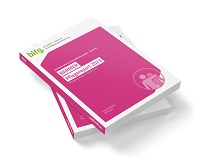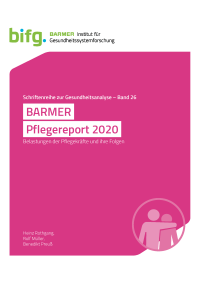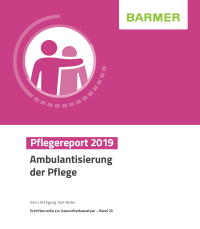
The BARMER Long-Term Care Report, which is published annually, assesses the current long-term care policy, gauges the long-term care situation, and analyses one focus theme. With respect to the latter, in this year’s Report, the authors Prof. Heinz Rothgang and Dr. Rolf Müller (both SOCIUM) examine the situation of people in need of long-term care in hospitals.
Coalition agreement targets have not been met
The chief objectives laid out in the coalition agreement on the further development of long-term care insurance and the financing of long-term care have not yet been implemented. These concern, among other things, the tax financing of non-insurance benefits such as pension contributions for family caregivers, the exclusion of training costs from co-payments in residential care, and the refinancing of medical treatment care in nursing homes. In view of the current financial situation and its assessment by the Federal Government, it is unlikely that these projects will come to fruition in the current legislative period.
As all long-term care insurance benefits are capped or flat-rat benefits, the adjustments of their respective sum are an important issue. In the Care Support and Relief Act (Pflegeunterstützungs- und -entlastungsgesetz), adjustments have been introduced which come into force in 2024 and 2025, respectively. However, the adjustments made are inadequate: due to inflation in home care, by 2027 the loss in purchasing power amounts to 18 percent for cash benefits and 14 percent for in-kind benefits, while today co-payments in nursing home are higher than ever before and will even increase until 2026. In this respect the legislation has failed to meet its target.
People in need of care make up a quarter of patients in hospitals
With increasing age, not only the need for long-term care, but also the likelihood of hospitalization increases, and care is needed after hospital discharge. Between 2017 and 2022, the number of people who became care-dependent during the month of hospital admission remained constant between 260,000 and 276,000 per year. On the other hand, the number of hospital cases of people who were already care-dependent before they were admitted to the hospital has risen significantly during this period – from 2.71 million to 3.45 million. Overall, people in need of care make up around a quarter of patients in hospitals.
More than one million potentially avoidable hospital cases per year for people in need of care
More than one million hospitalizations among people in need of long-term care can be considered potentially preventable. These include, in particular, hospital admissions for diabetes mellitus, type 2, volume depletion, heart failure, other chronic obstructive pulmonary disease and other diseases of the urinary system. Besides quality in nursing and medical care, the individual care dependents’ cooperation and health related behaviour also play a role here.
Suddenly in need of care – what follows after hospital discharge?
When the need for care is identified in hospital, it is often associated with relatively sudden, serious illnesses such as a heart attack or stroke, and the care grades are usually higher than in other situations in which the need for care is determined. In such cases, the question of further care arises after hospital discharge, for which the home environment is often not adequately prepared. More than half (53.5 percent) of the people who are diagnosed as care dependent in the course of their hospital stay receive exclusively informal care after discharge – i.e., without mobile nursing services or nursing home care. 39.8 per cent receive long-term and 6.4 per cent move into nursing homes. In addition, one in seven people (14.2 percent) receives short-term care. Half of these people still receive full inpatient care a month later. Short-term care thus often bridges time until adequate care is organized.
Changes also for those already in need of long-term care due to hospitalization
For people who are already care dependent, the probability not only of hospitalization, but also potentially avoidable hospitalization is higher than for people without care needs. In many cases, the care grade increases after the hospital stay. As a result, relatives may also be faced with the challenge of changed care needs. Already in the month of hospital discharge, 5.6 percent of those in need of care who hitherto received informal care make use of a mobile long-term care service, and 2.7 percent move into a nursing home. Of those in need of long-term care who previously received mobile nursing care, 8.1 percent move into a nursing home in the month of discharge. Of the previous users of the in-kind long-term care services, 15.7 percent also use short-term care immediately after discharge, which is also very often used as a bridge to full-time inpatient long-term care.
Hospital stays are significantly longer for those in need of care
The search processes that are necessary to find adequate care can delay hospital discharges, while it is in the interest of hospitals, health insurance companies and those in need of care to keep hospital stays as short as possible. Although hospital discharge management is supposed to help with the transition, it often fails simply because there are not enough places in long-term care facilities and it sometimes starts too late and is poorly coordinated. Patients with a newly identified need for long-term care, for example, spend an average of three and a half days longer in hospital than people not in need of long-term care. This may be due to a more severe disease course, but also due to a necessary bridging period. Since subsequent use of short-term care extends the hospital duration by an average of another six days, it is likely that a longer search process for appropriate care is partly responsible for the longer hospital stays.
Download:
BARMER Long-Term Care Report 2023
Statement by Prof. Rothgang at the Press Conference
Slide Presentation by Prof. Rothgang at the Press Conference
Contact:
Prof. Dr. Heinz Rothgang
SOCIUM Research Center on Inequality and Social Policy
Mary-Somerville-Straße 3
28359 Bremen
Phone: +49 421 218-58557
E-Mail: rothgang@uni-bremen.de
Dr. rer. pol. Rolf Müller
SOCIUM Research Center on Inequality and Social Policy
Mary-Somerville-Straße 3
28359 Bremen
Phone: +49 421 218-58554
E-Mail: rmint@uni-bremen.de




















